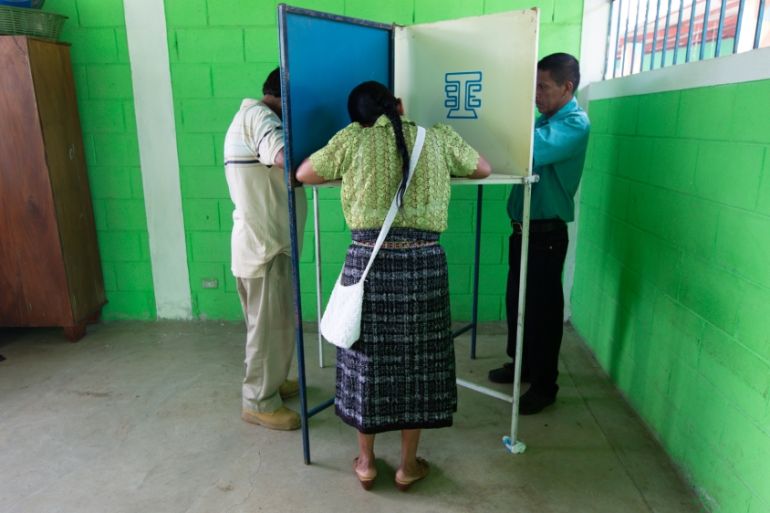Guatemalans vote in general election amid tensions
A top election official recently left the country due to threats of violence.

Guatemala City & Retalhuleu – Guatemalans began voting on Sunday morning in the country’s general election amid concerns of irregularities in recent days.
Nineteen candidates are in the race for president. Five others were barred from running during a chaotic campaign period. Voters are also electing all 160 legislators and hundreds of local officials.
National Unity of Hope party centrist candidate Sandra Torres leads the crowded field for president. A businesswoman and former first lady, she has focused her campaign on public investment and social programs.
Three right-wing candidates trail her in the polls: Vamos candidate Alejandro Giammattei, PAN-Podemos candidate Roberto Arzu, and Humanist party candidate Edmond Mulet.
Movement for the Liberation of the Peoples candidate Thelma Cabrera has been polling in fifth place. A social movement leader, she is one of three indigenous Maya presidential candidates.
If no single presidential candidate obtains an outright majority, as expected, the top two candidates will face off on August 11 in a presidential runoff election.
Irregularities
Over the past week, a series of reported irregularities have generated concerns. In a press conference on Saturday night, the country’s election tribunal condemned the circulation of misinformation, including reports of pre-marked falsified ballots.
In a statement on Saturday, the election tribunal also noted reports of politicised distribution of funds and goods, both prohibited by election law. Jordan Rodas, Guatemala’s human rights ombudsman, shares those concerns.
“We are worried about the series of prior incidents that have occurred, especially reports concerning the use of state resources to distribute food and handouts from the ruling party,” Rodas told Al Jazeera.
Two top officials with key roles in the election recently took leaves of absence. Neither the election tribunal’s citizen registry director nor the special prosecutor for election crimes are present on election day.
“It is very serious that the prosecutor for election crimes Oscar Schaad, together with his family, has had to leave the country due to serious threats against his life and safety,” said Rodas.
The human rights ombudsman’s office is monitoring the election process around the country alongside the United Nations human rights agency. National and international observers, including an Organisation of American States mission, are also observing the election.
High poverty rate
Election issues have dominated the news for months. But nearly 60 percent of the country’s 17 million people live in poverty and not everyone has time to keep up with the details.
“We don’t follow the elections too much. We are just always working,” Dimas Urias, a street sweeper in Guatemala City, told Al Jazeera.
“We hope things change.”
The vote may have concrete global implications. Guatemala is now the top country of origin of migrants and asylum seekers apprehended at the United States’ southern border.
The issue of immigration has been largely absent from the election campaign, as the US continues to focus on a crackdown and enforcement instead of addressing root causes of the northbound exodus.
“We have let Guatemala down,” Christine Wade, a professor of Central American politics at Washington College in Maryland, told Al Jazeera.
“Our policy has been antithetical to what we say we want to do,” she said.
The leading candidates in Guatemala’s elections are not focused on key drivers of migration, such as climate change and corruption, and neither is US foreign policy, said Wade.
A United Nations-backed anti-impunity commission, CICIG, has been working with Guatemalan prosecutors. Their efforts have yielded hundreds of arrests, including high-level government officials, but also a backlash.
President Jimmy Morales began taking action against CICIG after the body started investigating him for illegal campaign financing in his successful run for president in 2015. Last August, Morales announced he would not renew CICIG’s mandate, effectively shutting down the commission as of this coming September.
For years, the US was one of CICIG’s biggest supporters and funders. But US support waned alongside that of Morales, a key US ally in the region.
“We still don’t seem to take seriously this issue of corruption,” said Wade. “Our failure to support CICIG has been a huge mistake.”
Emilio Miranda has more immediate concerns. A truck driver from Sibana, a village 190 kilometres west of Guatemala City in the Retalhuleu department, Miranda is focused on the poor condition of local roads.
“Our previous officials have done little. The roads are ruined,” he told Al Jazeera.
“We need progress,” said Miranda. “We will see if whoever is elected responds to the needs of the people.”
Election results are expected on Sunday night. Winners in the presidential, congress and local races will take office in January 2020.
|
|